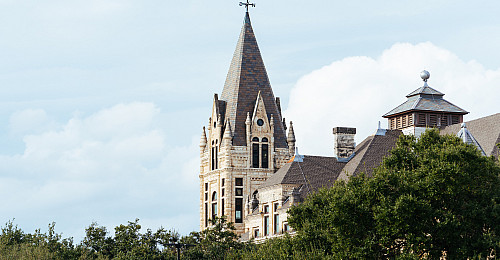Study Abroad
Student Feature: A Summer to Remember in the Heart of Argentina
Noah Saenger ’26 spent a life-changing summer in Buenos Aires, immersing himself in the culture, history, and language. Through the six-week program, he explored iconic sites, bonded with locals, and deepened his passion for Spanish.
Open gallery

Written By: Maggy Hayes
For Noah Saenger ’26, Summer 2024 was an unforgettable experience in Buenos Aires, Argentina. This program is 6-weeks, and 8-credits long and is led by Dr. Carlos de Oro, a Spanish Professor at Southwestern University. Students were offered remarkable cultural immersions that were connected with their classroom learning through this experience. Named the Best Latin American City, Buenos Aires offers a rich array of cultural traditions, cuisine, artistic experiences, sports, vibrant nightlife, and more.
“My first memorable experience from the city was eating some of the best food I’d eaten at a restaurant with my friend Will,” Saenger recalls. “My favorite places to explore in the city were the Parque Rosedal, a wonderful park with trees and many flowers, as well as Plaza Serrano, a plaza of hip shops and awesome places to eat.”
The integration of classroom studies with immersive experiences is a cornerstone of Southwestern University’s study abroad program because it creates life-changing opportunities for students. The Buenos Aires 2024 program is designed for students with advanced Spanish proficiency. To be eligible, the completion of three semesters of Spanish at Southwestern is necessary. With three semesters of building their skills, Saenger and his classmates were given the opportunity to live with a Spanish-speaking family during their time in Buenos Aires. Saenger recalls several fond memories of his time with his host, Fernando. “When we first met, I knew we would become friends and share stories, despite him being seventy-eight years old. Not only did we have similar personalities, but we also shared many interests, particularly music and guitar. He taught me some songs and let me play on his guitar freely. Every time we ate a meal, it would take us at least an hour to finish because we couldn’t stop chatting!”
The immersive opportunities, like the one Saenger describes with Fernando, were complemented by excursions that reinforced the lessons students had been studying over the course of three semesters. Students explored iconic neighborhoods, strolling through the vibrant streets of La Boca, ventured on day trips to Colonia and El Tigre, and marveled at the majestic Iguazú Falls. Additionally, students were taken on an overnight trip to an estancia, where they experienced an authentic Argentine ranch life. In the classroom, Professor De Oro led the course on Latin American Cultures and Communities, complemented by Conversation in Context sessions with API faculty.
Reflecting on his previous studies, Saenger recalls reading La Guerra Sucia in Spanish class just one semester before studying abroad—a novel that examines a dark period in Argentine history marked by economic and social upheaval, from 1976 to 1983. During their study abroad experience, students had the opportunity to visit the Escuela de Mecánica de la Armada (ESMA), a key setting in La Guerra Sucia. “On our trip to the ESMA, where prisoners were taken, we learned of the awful effects of conspiracy and suspicious governments that hurt their people out of fear of the opposition,” said Saenger. “Being there in person was an unforgettable experience.”
Alongside reinforcing classroom teachings, Saenger feels as though some of his most valuable lessons in Buenos Aires were learned through his daily activities. Mastering the art of public transportation in a foreign country, for example, is a challenge that study abroad students are often faced with. Upon arrival in Buenos Aires, Saenger realized that “the subway and bus are by far the most popular modes of public transportation. At first, using public transport in a foreign place was quite uncomfortable, but after some time, it became enjoyable and adventurous to use the cheap transportation as a means of exploration.”
The rich cultural experiences in Buenos Aires provide students with a unique chance to explore their interests in the context of the program. Now back on campus in Georgetown, Saenger is certain that his time in Buenos Aires has deepened his passion for continuing his study of the Spanish language. “The trip taught me that learning a language is an achievable goal, and that teaching languages is possibly in my future!” Saenger says.














